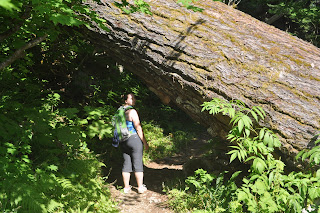One of the blogs that I read,
Kevin Kossowans, has a video interview with a pair of farmers who are managing a third-generation farm, and I've watched the video a few times because I wanted to make sure that I understood what they were saying.
What they're describing is taking 1/3rd of their land and planting trees and shrubs and grasses on it, and using the other 2/3rds of their land for raising heritage grains organically. They make mention of the high-input modern farming methods -- you put a lot into the soil to get a decent harvest - but as this is a new venture apparently,they are speaking of the future and their hopes. Time will tell if they can make a go of it.
The video is very hopeful, you get a feel that they are true believers, and that they honestly believe that what they're doing will give them a better result than previous generations have, and I'd like to think that too. I'm all for people trying different things.
But what I was thinking was how this is really a first-world farming problem. The vast majority of the farmed land out there is farmed by people who just can't throw away 30% of their land permanently; who choose farming methods based on a need to produce -- and not just profits, but food for their family.
Let me give you an example from my own experience: I was in Zambia; I was rafting down the Zambezi river; there were about 20 of us on 4 rafts, and what it did was it put us into a very rural part of Africa -- in that part of Zambia or Zimbabwe (the Zambezi river forms the border between the two countries) there may not be roads, and in this area there wasn't. But I was surprised to learn that corn meal, and corn mush, was a staple of the local communities, and we saw many hand-irrigated corn fields as we floated by. The locals would put their corn up a bluff from the river so that the hippos wouldn't eat it, or as much, and they irrigated their fields with hand-carried 5 gallon buckets. You'd see these skinny kids carrying two buckets up a hill hundreds of times every day; they'd pour the buckets out and then return to the river and get another pair. They'd tied ropes to the handle of the bucket and they'd throw their bucket into the river and drag it back with the rope. Because if they got too close to the waters edge a croc might get them.
Those farmers, if the crop failed, starved. If they had an abundant crop with a surplus they could sell, life was good. In our area of the country we are worried about "returning" land to what it was. In other parts of the world it's a matter of life or death.
So I'm watching these two idealistic Canadian farmers extol the virtues of the native grasses and trees, and I wonder what the bucket brigade would think about it. Our food system is producing enough food to feed the world now, but part of that is the fact that our per-acre-yields of virtually every kind of food has increased dramatically over the past 50 years. Heritage grains are great, and there is a market for it, but the majority of the world needs that high yielding grain.
As an example,
corn yields have increased by 6x since 1940, and more corn is now being grown on fewer acres as a result -- if you really want to "save the land" maybe you should plant the most efficient seed you can and give the rest back to nature.
About the only reason that they're able to even consider this course of action is that the land is (presumably) paid for, inherited or otherwise debt free. Otherwise, as most farmers, you have a mortgage and a land payment and the you really don't have this sort of choice. Maybe there's some sort of government program to sell carbon credits. I'd be very uneasy about any farm plan that depended on a government program for survival -- politics change, and so do laws.
We have a culture that says that fallow land, land that is allowed to go "back to nature" is laudable and good. I take a different view. If you take good farmland and make it fallow, your actions are destroying something that in another country would cost people their lives. In the same way that I object to ethanol, I think that people who plant houses on good, fertile land are committing a sin. It wasn't too long ago when we couldnt' feed everyone, and that time will come again. I'll go a bit further: If you're holding acreage and choose methods and crops that produce just the bare minimum from your land -- like you own 80 acres and produce 5 calves a year -- it's not as egregious a sin, but it is no less a sin. Shame on you.
And I'd hate to see people die because someone wanted a big lawn, or out of ego or hubris
just decided to destroy a farm.










































